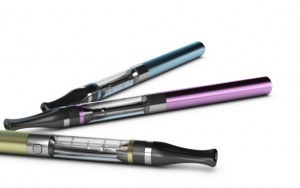 Electronic cigarettes, or as they are more popularly called, e-cigarettes, are designed to look like traditional tobacco cigarettes. Though the e-cigarettes contain no tobacco, they can be harmful because they contain nicotine which is a cancer causing chemical. Their manufacturers would like the public to believe that they are a safer alternative to cigarettes, but this may not be the case.
Electronic cigarettes, or as they are more popularly called, e-cigarettes, are designed to look like traditional tobacco cigarettes. Though the e-cigarettes contain no tobacco, they can be harmful because they contain nicotine which is a cancer causing chemical. Their manufacturers would like the public to believe that they are a safer alternative to cigarettes, but this may not be the case.
How they work – The user inhales through a mouthpiece similar to traditional cigarettes. This flow of air triggers a sensor that turns on a small battery operated heater. The heater warms up a capsule that contains nicotine and propylene glycol. The vapor that is created gives the user the sensation of smoking a traditional cigarette. The vapor from these e-cigarettes also contains formaldehyde and acetaldehyde which can also cause cancer.
The U. S. Food and Drug Administration has done a preliminary analysis of these devices and concluded that the vapors that they emit contain other carcinogens, such as nitrosamines and diethylene glycol. It is presumed that the effects of smoking these e-cigarettes would have similar second hand effects as regular tobacco products and their use should be regulated in a similar manner.
Though they have been marketed as an aid to stop smoking for those trying to quit, there is no evidence that proves that these e-cigarettes accomplish that goal. If you smoke, or know someone who does, and are interested in quitting we recommend speaking with your physician or joining a smoking cessation program such as Jamaica Hospital Medical Center’s Freedom from Smoking Program. A representative can be reached at 718 206 8494. Additional resources can also be found at www.nysmokefree.com.
For more health and fitness tips, Like us on Facebook or follow us on Twitter.
All content of this newsletter is intended for general information purposes only and is not intended or implied to be a substitute for professional medical advice, diagnosis or treatment. Please consult a medical professional before adopting any of the suggestions on this page. You must never disregard professional medical advice or delay seeking medical treatment based upon any content of this newsletter. PROMPTLY CONSULT YOUR PHYSICIAN OR CALL 911 IF YOU BELIEVE YOU HAVE A MEDICAL EMERGENCY.
